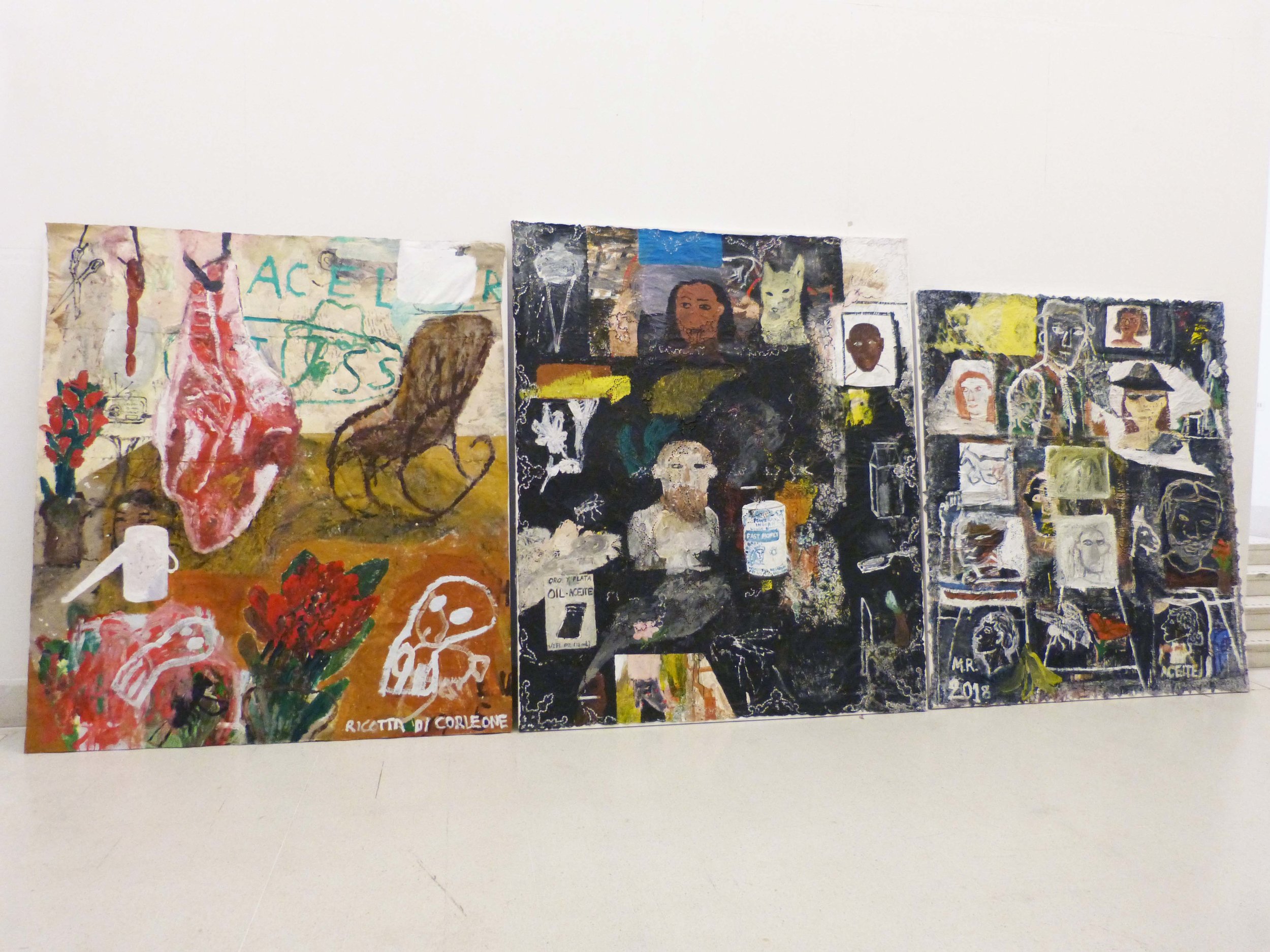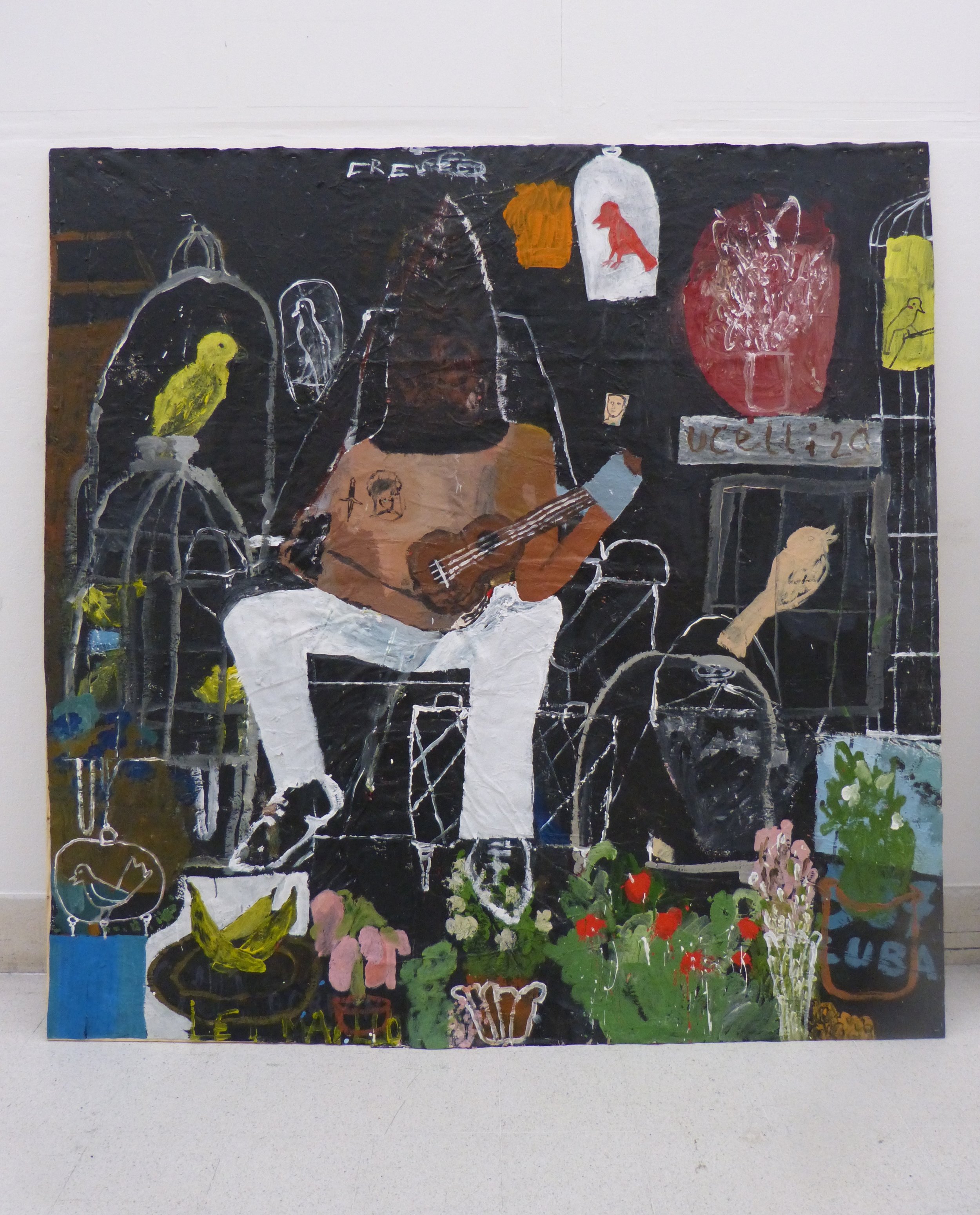Maïa Régis

“There are elements of violence in my paintings: weapons, hidden figures, meat hanging from hooks… But all that is counterbalanced by more calm and joyful elements like a flower bouquet, fruit, bright colours… Keeping a balance between the two helps me not to fall into romanticism or morality.”
Interview by: Simek Shropshire
You’ve mentioned that you, as an artist, “like to navigate in troubled waters, between the real and the fictional; between drama and joy, tension and calm”. In what ways does this navigation in an allegorical grey space manifest itself in your paintings? What role does it play in your selection of subject matter and overall tone?
It’s like the opening scene in Raging Bull where Scorsese films a De Niro on the boxing ring, preparing for his fight. There’s such an intensity and a rage in his movements, he’s got a hood on, it’s filmed black and white… Yet it’s magnified by slow motion and classical music on top.
I’m interested in these contrasts. Making gold from mud.
There are elements of violence in my paintings: weapons, hidden figures, meat hanging from hooks… But all that is counterbalanced by more calm and joyful elements like a flower bouquet, fruit, bright colours… Keeping a balance between the two helps me not to fall into romanticism or morality.
I search for unexpected situations or associations of objects and drips.
It’s an atmosphere of contrast that I find a lot in Southern countries, especially Sicily, where my mother’s from.
The narrative of my paintings aren’t clear, I leave that to the viewer’s imagination. The ambiguity keeps a certain tension in the work which I think is necessary for it to be lively.
I listen to a lot of trap music. Rappers go from one sentence to another, from a theme to the other without a linear approach but an overall poetic atmosphere.
I also admire a lot how the writer Bret Easton Ellis manages the narrative in his books: the narrative is almost hard to follow, floating and going from a place to the other or writing discussions without a typical introduction. He also deals with a lot of violence, but with never attaching any judgement to it. I’m fascinated by how he manages to write about horrific characters without any morals, and make it poetic.
Could you tell us a bit about yourself and your background? Where did you study?
I’m originally from Paris, and moved to London in 2014 to do a foundation in Art and Design. I then moved on to do a BA Fine Art at Chelsea College of Art and now I’m currently in my second (and final) year of MA Painting at the Royal College of Art.
There is a denseness in visuality and subject matter in your work that simultaneously exhibits traits of Abstract Expressionism and is reminiscent of geometric collage. How did your multi-layered practice develop?
Before getting into painting, my first “sensorial chok” came from music. I’ve always been very curious about different sort of music around the world and got an eclectic taste, going from soul to opera, to electronic music to popular Neapolitan songs to rap…
The way I paint is imprint of the mode of sampling, a technique which consists in mixing different musicals patterns (electronic music, gospel, hip hop, classical, blues etc.) on one sound recording to develop a new work.
I’m influenced by diverse sources. I was marked by the energy of Baselitz, Guston, Mitchell, Twombly, Tapiès but also by the plenitude of Matisse, Picasso and Miro.
I’m as much influenced by those artists as I am in different folk arts like Women painters of village India, Ndebele tribe house paintings, Mexican and Sicilian ex-voto paintings, or even Cuban Santero rituals.
le slip bleu
Tell us a bit about how you spend your day / studio routine? What is your studio like?
I usually go swimming where I live in Brixton, before I go to the studio.
I’m currently working in my RCA studio in the Kensington building. It’s a mess. There is one or two paintings on the wall, but I usually paint on the floor, walking on my painting, which takes up my entire studio space, so there’s not much space to walk around… Paint, pigments, brushes on the floor…
I’ve had the chance of having very different kind of studios, the most important thing to me being having a large space as I always work large scale. I’ve worked in Sicily a lot, in huge parking lots or abandoned buildings that are going to be restructured. I feel that there are so many possibilities there.
What artwork have you seen recently that has resonated with you?
Kerry James Marshall at David Zwirner, Joe Bradley at the Gagosian, Todd Bienvenu at Almine Rech.
Filmwise, I loved Mektoub My Love by Abdellatif Kechiche and A Family Affair by Hirokazu Kore-eda, which won the Palme d’Or in Cannes. Both very sensorial films.
installation view hockney gallery
Wasp in The Box, Fast Money
How do you go about naming your work?
I think of it as an extension of the painting. I keep the same energy, continuing what the painting does but with words. I enjoy this part a lot, and in the making of the painting possible titles come to my head. I look at it almost as writing poetry.
Is there anything new and exciting in the pipeline you would like to tell us about?
I’m currently showing a painting in the Bloomberg New Contemporaries 2018 show which just opened recently at the South London Gallery.
I’m soon going back to Palermo (Sicily) for one month to do some work which is very exciting to me.
Keep an eye on the RCA degree Show 2019 in June!
All images are courtesy of the artist
Date of publication: 21/01/19





